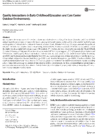Abstract
Quality interactions are crucial for children’s learning and development. Early Childhood Education and Care (ECEC) centers have the opportunity to support children’s learning and development, yet the quality of interactions and influences on the quality of interactions in outdoor environments is not known. Research findings: this study assessed the quality of educator interactions in outdoor environments using the CLASS Pre-K assessment tool. 11 ECEC centres participated in the study, which included 110 educators and 490 children. 87 observations were collected to measure the CLASS Pre-K domains (1-lowest to 7-highest). Mean domain scores were 6.02 (emotional support), 5.23 (Classroom Organization) and 4.46 (Instructional Support). Regression analyses show free routines had significant relationships with Teacher Sensitivity (p = 0.03) and Instructional Learning Formats (p = 0.03), and increased amounts of time spent outside had the most significant relationships with Teacher Sensitivity (p = 0.001) and Behavior Management (p = 0.001). Practice or Policy: The major recommendations that would serve to improve the quality of interactions in outdoor environments include providing a free routine and increasing the amount of time spent in outdoor environments. As these recommendations are modifiable practices, they are potentially the easiest to alter and therefore, with minimal change, could enhance the quality of interactions between educators and children.



Responses